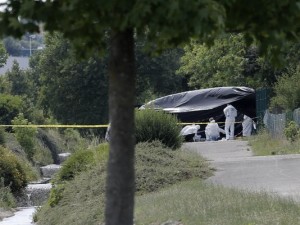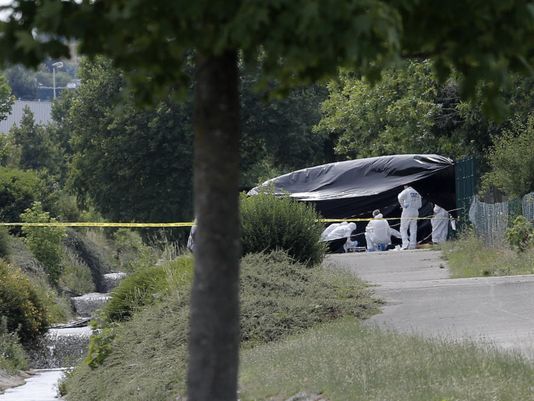Yassine Salhi, the man detained Friday in connection with a deadly attack on a gas factory in southern France, was known to intelligence services but had not been actively monitored by security officers since 2008.

French Interior Minister Bernard Cazeneuve said Salhi, 35, a father of three who lived in a suburb of Lyon, had been placed on a “radicalization list.” An image of Salhi, who local French media reported may be of Moroccan and Algeria descent, was not immediately available.
A decapitated man was found at the scene, and two other people were injured when a truck rammed into gas canisters at the factory, setting off an explosion.
Cazeneuve said Salhi was thought to be under the influence of the extreme Salafist branch of Islam that calls for the faithful to return to the religion’s roots. His case was filed under “form S” — meaning he was marked as a person susceptible to engaging in harmful acts against France but who had not traveled to Syria or Iraq.
Those two countries are at the center of a recruitment drive by the Islamic State extremist group. Paris Prosecutor Francois Molins said two flags with Islamic declarations were near the severed head, which was found hanging on the factory’s gate.
After Salhi was taken into custody, Molins said the decapitated man found at the factory was the boss of the transportation company that the driver worked for in southeastern France. His name of the boss was not released.
Local police chief Jean Paul Bonnetain said the vehicle involved in the attack was authorized to enter the factory. Molins said at a news conference that Salhi was well known among employees at the plant because he regularly made deliveries there.
Local media reported that Salhi recently moved to the area and previously lived in an area called Pontarlier, near the Swiss border in eastern France. Police documents written in 2013 and 2014 characterize Salhi and two of his friends as “hard Muslims” after they attempted to create an Islamic institute in Besançon, a city in eastern France, according to French TV station RTL.
In one of the documents dated May 2014, police referenced signs of radicalization exhibited by Salhi, noting “regular absences for long periods of time estimated at 2 or 3 months without him saying where he was going,” RTL reported.
Salhi’s wife, sister and another suspect were also detained Friday, Cazeneuve said. Earlier, a woman claiming to be his wife was interviewed on French radio.
“My heart is about to stop,” she said. “I don’t know what happened. He (Yassin) went to work this morning at 7 in the morning. He is a delivery man. Yesterday he came from work. He was normal. This morning he went to work,” she said.
“It’s not possible. He’s my husband I know him. He’s normal. You can come see our home. We have a normal house,” she said.






